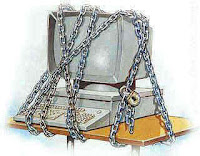It was not very long ago where people did not have computers in their homes and have smartphones in their pockets, and did not have to ponder about things like internet safety, computer viruses, spyware and identity theft. Back then, it may have been a simpler time, but there is no doubt that technology has done some wonderful things, and in many ways has made the world around us a much better place.
These days, computer security may be just as important as the safety of your bank account or even your home, because in many cases, the computer does contain all that information inside of it somewhere- and, when that is the case, it also means that there is someone out there who will try to take that information. That is why it is very important to brush up on your knowledge of computer safety and learn how to manage and monitor that safety. In the end, it will save you some big headaches and may also save you from becoming a victim of a computer virus, internet hacker, Trojan Horse program or any other type of computer security risk. Like the saying goes, “it is better to be safe, than sorry,” which rings very true when it comes to all matters concerned with computer and internet safety. Here are some things you can do to better familiarize yourself with the basic protocols of computer safety:
Computer Security Tip #1. Learn About Web Browsers
The best and easiest thing you can do to improve your knowledge of internet safety is to look into getting the safest internet browser you can. The internet is how most malicious programs find their way onto your computer, so having a safe browser is a great way to familiarize yourself with the basics of computer safety. Visit the help sections of the browser and consult the handbooks for the information on internet browser security, this will go a long way towards informing your view of computer safety and security.
Computer Security Tip #2. Learn About Firewalls And Routers
The router is what connects you to the internet, and also plays a big role in the overall security of your computer and the information that is stored within it. A firewall is the basic cornerstone of the routers internal security system, so it is in many ways the first line of defense against malicious programs and software that may try to sneak its way into your computer.
Computer Security Tip #3. Learn About Anti-Virus Software
This is another important thing to do when familiarizing yourself with computer safety. The anti-virus programs are the final line of security on a personal computer. gus, it is important to get a good one.
J.B. is a freelance writer for a host of websites, blogs, magazines and newspapers. His work can be read all over the internet, and therefore all over the world. Most of his writing focuses on internet security. His favorite computer security programs can be found at hijackthis.
These days, computer security may be just as important as the safety of your bank account or even your home, because in many cases, the computer does contain all that information inside of it somewhere- and, when that is the case, it also means that there is someone out there who will try to take that information. That is why it is very important to brush up on your knowledge of computer safety and learn how to manage and monitor that safety. In the end, it will save you some big headaches and may also save you from becoming a victim of a computer virus, internet hacker, Trojan Horse program or any other type of computer security risk. Like the saying goes, “it is better to be safe, than sorry,” which rings very true when it comes to all matters concerned with computer and internet safety. Here are some things you can do to better familiarize yourself with the basic protocols of computer safety:
Computer Security Tip #1. Learn About Web Browsers
The best and easiest thing you can do to improve your knowledge of internet safety is to look into getting the safest internet browser you can. The internet is how most malicious programs find their way onto your computer, so having a safe browser is a great way to familiarize yourself with the basics of computer safety. Visit the help sections of the browser and consult the handbooks for the information on internet browser security, this will go a long way towards informing your view of computer safety and security.
Computer Security Tip #2. Learn About Firewalls And Routers
The router is what connects you to the internet, and also plays a big role in the overall security of your computer and the information that is stored within it. A firewall is the basic cornerstone of the routers internal security system, so it is in many ways the first line of defense against malicious programs and software that may try to sneak its way into your computer.
Computer Security Tip #3. Learn About Anti-Virus Software
This is another important thing to do when familiarizing yourself with computer safety. The anti-virus programs are the final line of security on a personal computer. gus, it is important to get a good one.
J.B. is a freelance writer for a host of websites, blogs, magazines and newspapers. His work can be read all over the internet, and therefore all over the world. Most of his writing focuses on internet security. His favorite computer security programs can be found at hijackthis.

No comments:
Post a Comment